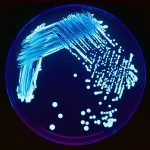Legionella pneumophila is an environmental bacterium that grows in hot water systems but can also cause legionellosis, a severe pneumonia. For example it was recently diagnosed in 87 patients in Flint (Michigan) and in Portugal where an epidemics with over 300 infected people occured. Legionella pneumophila is an intracellular bacterium that has a very sophisticated system to exploit the host cell functions to its own advantage allowing it to cause disease. A study published in Proceedings of the National Academy of Sciences (PNAS) revealed that one of the proteins secreted by Legionella pneumophila helps to block the antibacterial response of the infected host cells by changing the lipid metabolism and thereby blocking the cellular defense mechanisms based on autophagy.















